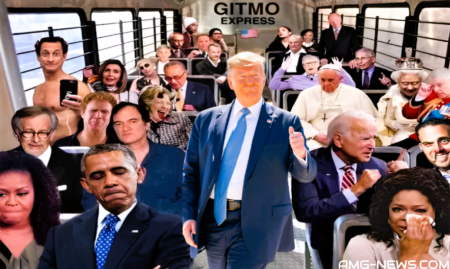BOMBSHELL!!! Saudi Arabia Just Ditched the US Dollar: BLACK SWAN!?
Ready to uncover the truth? Sick of the lies? Join our Telegram Channel now. It’s time for the real story! My gratitude to all my readers!
In an unprecedented move that has sent shockwaves through the global financial markets, Saudi Arabia has announced it will not renew its 50-year petrodollar agreement with the United States. Instead, the Kingdom will now sell oil in multiple currencies, including the Chinese RMB, Euros, Yen, and Yuan.
This historic shift could dismantle the economic hegemony the U.S. has enjoyed for decades and is poised to redefine international trade dynamics. While the U.S. government seems preoccupied with domestic trivialities, this black swan event has far-reaching implications for the future of global economics. Buckle up; it’s going to be a bumpy ride.
The End of an Era: Saudi Arabia’s Departure from the Petrodollar
For nearly half a century, the petrodollar system has been the cornerstone of global energy transactions and a critical pillar of American economic dominance. Established in the aftermath of World War II, this agreement between Saudi Arabia and the U.S. ensured that oil would be traded exclusively in U.S. dollars. This arrangement not only solidified the dollar’s position as the world’s primary reserve currency but also allowed the United States to exert significant influence over global oil markets and international trade.
However, the announcement by the Saudi Arabian prince marks the end of this era. By choosing to diversify the currencies in which it sells oil, Saudi Arabia is effectively undermining the petrodollar system. The ramifications of this decision are profound, potentially reshaping the global financial landscape and altering the balance of power.
Why Saudi Arabia is Making the Switch
Several factors have contributed to Saudi Arabia’s decision to move away from the petrodollar. At the forefront is the Kingdom’s strategic pivot towards strengthening its economic ties with emerging markets, particularly China. The Chinese RMB and Yuan are becoming increasingly significant in international trade, and by accepting these currencies, Saudi Arabia is positioning itself to capitalize on this trend. Additionally, the Euro and Yen offer stability and liquidity, making them attractive alternatives to the dollar.
 Another crucial element is the growing discontent with the U.S. dollar’s volatility and the economic policies of the United States. In recent years, the dollar has experienced significant fluctuations, and the U.S. government’s handling of economic crises has raised concerns about the sustainability of its financial policies. By diversifying its currency portfolio, Saudi Arabia aims to mitigate these risks and ensure greater stability for its economy.
Another crucial element is the growing discontent with the U.S. dollar’s volatility and the economic policies of the United States. In recent years, the dollar has experienced significant fluctuations, and the U.S. government’s handling of economic crises has raised concerns about the sustainability of its financial policies. By diversifying its currency portfolio, Saudi Arabia aims to mitigate these risks and ensure greater stability for its economy.
The Impact on the United States
The decision by Saudi Arabia to abandon the petrodollar is a severe blow to the United States. For decades, the petrodollar system has allowed the U.S. to maintain a high standard of living, finance its massive deficits, and exert considerable influence over global economic affairs. The dollar’s status as the world’s primary reserve currency has enabled the U.S. to borrow cheaply and invest heavily in its military and infrastructure.
With Saudi Arabia now accepting multiple currencies for its oil exports, the demand for U.S. dollars is likely to decrease significantly. This reduction in demand could lead to a depreciation of the dollar, making imports more expensive and potentially fueling inflation. Additionally, the U.S. may find it more challenging to finance its deficits, leading to higher borrowing costs and increased pressure on the federal budget.
Global Financial Turbulence: What Lies Ahead
The implications of Saudi Arabia’s move extend far beyond the United States. The shift away from the petrodollar is likely to trigger a ripple effect across global financial markets. Countries heavily reliant on dollar-denominated oil imports may face increased currency volatility and economic uncertainty. Central banks around the world, which hold significant reserves of U.S. dollars, may reassess their currency portfolios, leading to a reallocation of assets and potential market instability.
Moreover, this decision could accelerate the trend towards a multipolar global economy, where multiple currencies, rather than a single dominant currency, facilitate international trade. This transition could create new opportunities for emerging markets and increase competition among major economies. However, it also poses risks, as the absence of a clear leader in global finance could lead to greater fragmentation and instability.
THE RED PILL: Discover The Secret Used By A Former CIA Scientist To Open Your ‘3rd EYE’
The Broader Geopolitical Implications
Beyond the economic consequences, Saudi Arabia’s decision has significant geopolitical ramifications. The petrodollar system has been a critical element of the strategic alliance between the U.S. and Saudi Arabia. This partnership has enabled the U.S. to exert influence in the Middle East and maintain a strategic presence in the region. By moving away from the petrodollar, Saudi Arabia is signaling a shift in its geopolitical orientation.
Strengthening economic ties with China and other emerging markets suggests that Saudi Arabia is seeking to diversify its alliances and reduce its reliance on the United States. This realignment could alter the balance of power in the Middle East, with China playing a more prominent role in the region’s economic and political affairs. Additionally, it may embolden other countries to pursue similar strategies, further diminishing U.S. influence on the global stage.
Preparing for a New Financial Order
As we stand on the cusp of this new financial order, it is crucial to understand the long-term implications of Saudi Arabia’s decision. The transition away from the petrodollar is likely to be a complex and turbulent process, with far-reaching consequences for global trade, financial markets, and international relations. While the full impact of this shift will unfold over time, several key trends are already emerging.
1. Increased Currency Diversification: Countries and corporations will likely seek to diversify their currency holdings and transactions. This trend will reduce dependence on the U.S. dollar and increase the use of other major currencies, such as the Euro, RMB, and Yen. Financial institutions will need to adapt to this new landscape by expanding their currency trading capabilities and developing new financial products.
2. Enhanced Role of Emerging Markets: Emerging markets, particularly China, will play a more prominent role in the global economy. As these markets become more integrated into the international financial system, their currencies will gain greater acceptance and influence. This shift will create new opportunities for investment and trade but also introduce new risks and challenges.
3. Volatility and Uncertainty: The transition to a multipolar currency system will likely increase volatility and uncertainty in global financial markets. Central banks and financial institutions will need to develop new strategies to manage these risks, including enhanced risk assessment and hedging techniques. Policymakers will also need to collaborate on a global scale to address potential instability and ensure a smooth transition.
4. Geopolitical Realignments: The decline of the petrodollar will lead to significant geopolitical realignments. Countries will reassess their alliances and partnerships, leading to a more fragmented and multipolar world order. This shift will create both opportunities and challenges for global governance, requiring new approaches to diplomacy and international cooperation.
Divine Dialogue: Mysterious Secret Phrase UNLOCKS the Power to Have Every Prayer Answered Instantly!
⚠️BLACK SWAN⁉️
In 1973, the United States and the Federal Reserve entered into a pivotal agreement with Saudi Arabia. This deal provided Saudi Arabia with military support, protection, and weaponry in exchange for using the U.S. dollar for all oil sales. This arrangement significantly bolstered the U.S. dollar’s dominance in global trade, particularly in the oil market.
Details
•U.S. Dollar Dominance: The agreement ensured that the U.S. dollar remained the primary currency for international oil transactions, reinforcing its status as the world’s reserve currency.
•Military and Economic Alliance: The deal fortified the U.S.-Saudi relationship, providing a strategic military alliance in the Middle East and ensuring the steady flow of oil to Western markets.
Sources: Historical records from the U.S. Department of State and financial documents from the Federal Reserve provide detailed accounts of this agreement.
The End of an Era: Saudi Arabia’s Announcement
The 50-year contract between the U.S. and Saudi Arabia is set to expire on June 9. Saudi Arabia has announced that it will not renew the agreement and will no longer conduct oil sales in U.S. dollars.
Detail
•Shift in Global Trade: Saudi Arabia’s decision to abandon the U.S. dollar for oil sales marks a significant shift in global trade dynamics.
•Economic Implications: This change threatens the value and dominance of the U.S. dollar, potentially leading to financial instability and hyperinflation in the United States.
Sources: Statements from Saudi government officials and financial analysts provide insights into the potential impacts of this decision.
Operation Sandman: The Scenario
Operation Sandman refers to a hypothetical scenario in which multiple countries simultaneously stop using the U.S. dollar for international trade, particularly for oil transactions. This coordinated effort is designed to diminish the dollar’s role in global finance.
Details
•Devaluation of the Dollar: If implemented, Operation Sandman could trigger a large-scale devaluation of the U.S. dollar.
•Global Financial Impact: The shift away from the dollar could lead to hyperinflation and significant financial instability in the United States and potentially globally.
•Geopolitical Strategy: This operation reflects a strategic geopolitical move to reduce U.S. economic influence and reshape the global financial system.
Sources: Discussions from economic think tanks and geopolitical analysts explore the potential scenarios and outcomes of Operation Sandman.
Why Did Trump Partner with Saudis?
Ask yourself: is it normal for a President to make his first official trip to Saudi Arabia on May 20, 2017? While there, Trump sold $110 billion worth of arms to the Saudis. He also formed an alliance with Crown Prince Mohammed Bin Salman (MBS) and the Gulf Cooperation Council (GCC), which is the Special Forces division of friendly Middle Eastern nations.
•Mohammed Bin Salman (MBS): Crown Prince of Saudi Arabia
•Gulf Cooperation Council (GCC): Special Forces division of Middle Eastern nations
What Does All This Mean?
Trump has quietly built a coalition of military generals in the US and Saudi Arabia that can share intelligence to build cases against US citizens suspected of committing military crimes and international crimes or treason. Each offense is punishable by death from a military tribunal.
BRICS and Its Connection to the Saudi-U.S. Dollar Agreement:
BRICS, comprising Brazil, Russia, India, China, and South Africa, challenges U.S. dollar dominance. This alliance aims to reduce dollar dependency by promoting their currencies for trade. Saudi Arabia’s decision to end oil transactions in dollars aligns with BRICS’ goals, enhancing their influence in the global energy market and contributing to potential dollar devaluation, marking a significant shift in geopolitical strategy.
Wisdom:
 The Revolution Will Not Be Televised
The Revolution Will Not Be Televised
As Saudi Arabia’s departure from the petrodollar system unfolds, it is essential to recognize that this is just the beginning of a larger transformation. The global financial landscape is evolving, and the traditional power dynamics are being reshaped. While the U.S. government may be preoccupied with domestic issues, the world is witnessing a seismic shift with profound implications for future generations.
In conclusion, Saudi Arabia’s decision to abandon the petrodollar marks the end of an era and the beginning of a new chapter in global finance. This move has far-reaching consequences for the U.S., emerging markets, and the international financial system. As we navigate this turbulent transition, it is crucial to stay informed, adapt to new realities, and prepare for the challenges and opportunities that lie ahead. The revolution will not be televised, but its impact will be felt worldwide. Buckle up; it’s going to be a bumpy ride.
SOURCE
https://x.com/ChrisMcNelly/status/1801015321584710027
https://x.com/ShadowofEzra/status/1801012855627526349












2 Comments
Truth is … Saudi Arabia ditching the US dollar, is what is falling into place all around the world with 209+ countries … announcing only in sync with the plans unfolding (already done actually), and contrary to the video at end of this post … he most certainly will be witnessing the changes … because the US dollar as we know it will be dead by Trump’s win in the 2024 election all according to plan … and the world will be moving into an unknown time length of global peace, freedom, equality, and prosperity, for all; but in my heart, especially for TWNations who have been deliberately oppressed and impoverished beyond compare for centuries by the Cabal monsters behind the PlanDemic that was the straw that broke the camels back.
Speaking of the Cabal and their satanic monsters that manipulatively found their way into every sector of life and business around the world, now under the living God’s vengeance, thank you, Jesus … the following four justices, of too many to count, gravely deceived to do the devils bidding are not smiling today; and died dumber than a bag of hammers wallowing in their own ignorance… sad but choices we make for life or death begins and ends with Jesus or no Jesus! Luke 16:19-31
***
The four Colorado Supreme Court Justices who tried keeping President Trump’s name off the state’s primary ballot earlier this year were sequentially executed for treason at GITMO on June 10—better late than never.
As reported, a panel of military officers unanimously found Justices Richard L. Gabriel, Melissa Hart, Monica Márquez, and William W. Hood guilty of treason, and Vice Adm. Darse E. Crandall scheduled their executions for June 3. But for reasons not given to us, and which we could not independently determine, the admiral postponed the highly anticipated hangings until June 10.
The four were fed a final meal before being asked if they wanted Last Rites or a member of the cloth present at the gallows. Only Justice Márquez expressed interest in reconciliation, but said her faith, Paganism, required that a priestess of Kakia, the Greek goddess of vice and moral badness, deliver her from the “material plane” unto the next world. When told JAG had no priestesses available, Márquez accused JAG of discrimination and said that hanging a lesbian or non-binary person during pride month was morally and biblically unethical. (Real Raw News credit)
Os Árabes vão quebrar os EUA. Avante GESARA.